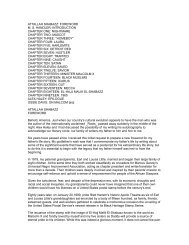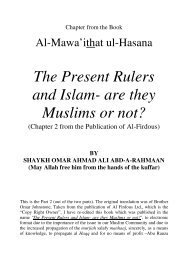Create successful ePaper yourself
Turn your PDF publications into a flip-book with our unique Google optimized e-Paper software.
Ironically, we find that Judaism has more in common with<br />
Christianity than <strong>the</strong> new ideology that Mendelssohn was<br />
seeking <strong>to</strong> force upon Judaism.<br />
Both Christianity and Judaism hold that <strong>the</strong>re was an<br />
au<strong>the</strong>ntic revelation at Mount Sinai. The difference of opinion<br />
between <strong>the</strong> two religions was whe<strong>the</strong>r this revelation was<br />
supplemented. Judaism maintains that <strong>the</strong> revelation was<br />
binding for all time, and Christianity maintains that it was<br />
supplemented and changed at a later date. Hence <strong>the</strong> term<br />
"New Testament," adopted by Christianity, which was sup-<br />
posed <strong>to</strong> supplant <strong>the</strong> "Old Testament," a term which <strong>the</strong><br />
believing Jew could never accept. What Mendelssohn was<br />
trying <strong>to</strong> foster were concepts that would undermine <strong>the</strong><br />
dogmatic foundation of Judaism, so much so that one could<br />
maintain that he denied <strong>the</strong> Divine revelation of <strong>the</strong> Torah and<br />
still be called a Jew.<br />
Mendelssohn was playing religious "hide and go seek." He<br />
was addressing himself <strong>to</strong> <strong>the</strong> semi-educated classes of Jews.<br />
He was saying that <strong>the</strong> ceremonial laws were revealed and <strong>the</strong><br />
philosophical laws were not, while any one who was well-<br />
grounded in Jewish law knew <strong>the</strong>re was an entire body of<br />
Jewish law called Hilchot Dayot, laws dealing with concepts<br />
and philosophies, such as <strong>the</strong> love of God, His existence,<br />
repentance, revelation, humility, etc.<br />
Mendelssohn became an object of derision among <strong>the</strong><br />
Rabbis, who would not cease from castigating him.<br />
Smolensken considers Mendelssohn as a central figure for<br />
revolution. In his Ha<strong>to</strong>eh Bedarkai Hachaim, 43 (He Who Errs in<br />
<strong>the</strong> Ways of Life) he refers <strong>to</strong> him as follows:<br />
"He was a merchant and not a Rabbi, and nei<strong>the</strong>r was he well<br />
learned in Jewish studies. As a merchant, he sold his people<br />
and his faith... Publicly he embraced everything and secretly<br />
he gave everything away for nothing."<br />
Mendelssohn was a "con artist" of <strong>the</strong> first order. He was<br />
telling <strong>the</strong> Jews <strong>to</strong> move out of <strong>the</strong> ghet<strong>to</strong> only by acquiring <strong>the</strong><br />
67




